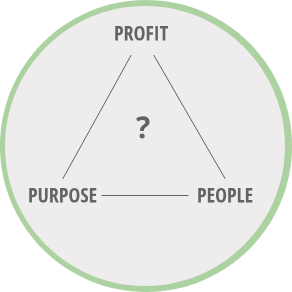Plural priorities: Up-skilling with REAL values-based skills
- Dean Williamson

- Feb 24, 2020
- 2 min read
Updated: Mar 2, 2021
We're at the point in our human journey where people are questioning the role of corporations and organisations. Everyone starts a business to improve something, but having competing aims in an organisation makes leadership challenging. This is particularly the case in publicly listed companies or those who receive startup or venture capital - profit and returns can come to dominate decision-making, often diluting the original purpose of the company.
However, the world is changing, and "business-as-usual" is shifting. Profit-only organisations are in less demand by employees, who are looking more-and-more for workplaces which share their values. Risk and compliance costs are also increasing for organisations which don't consider purpose and legacy, with environmental and workplace health and safety regulations evolving towards minimising externalities, or costs that can be externsalised by profit-maximising businesses.
Organisations optimise towards their values
One of the common challenges that we see in our clients who begin to shift towards embracing purpose or people beyond profit is that they inherently seem to revert to their original behaviours. This is because almost every act and conversation in a workplace is aligned towards values, and operates within the culture. The process of acculturation when you begin a role is the process of learning the "rules", which derive from an organisation's values. Hence, an organisation which is profit-maximising will create a system based on efficiency and cost reduction, while focusing on return on investment (ROI) for every extra dollar spent.
The challenge for adding in other organisational priorities (such as people or purpose) is that you're adding ambiguity into the entire system. All of a sudden a process which requests "expected ROI" asks a manager to begin quantifying other types of ROI, rather than just "expected profit from investment". Under-performing staff are no longer just a cost to be jettisoned, but line managers start asking questions about their responsibility for staff well-being - "is this a good time for the person if I let them go?" All kind of indicators of systemic performance come into question (e.g. profit per employee?).
So quite naturally, people and systems will drift towards safety. Having diverse or plural priorities (without a process) introduces elements of chaos and uncertainty that many people won't inherently like.
Leadership skills change in this environment
We suggest that, as priorities become more plural, distributed leadership capacity needs to increase. In organisations with plural priorities, many smaller scale decisions become a balancing of factors based on context, rather than a situation which can be managed by centralised policy and procedure. You're effectively asking leaders to manage complex ethical conundrums on your behalf, and setting some parameters for how they should approach these. This is where organisational values come to life - as decision-making tools. In essence, values are necessary once you progress past "profit-only".
This is where organisational values come to life - as decision-making tools. In essence, values are necessary once you progress past "profit-only".
Leaders need to know the values, and need skills and approaches for how to APPLY and use them flexibly to guide team culture. Conversations move from "do this" to "how do we get the best outcome here balancing these factors?"
It's a different skill set to equip your leaders. But once you take away "do this", you're already moving towards trusting them more - you should at least make sure they have the skills.








Comments